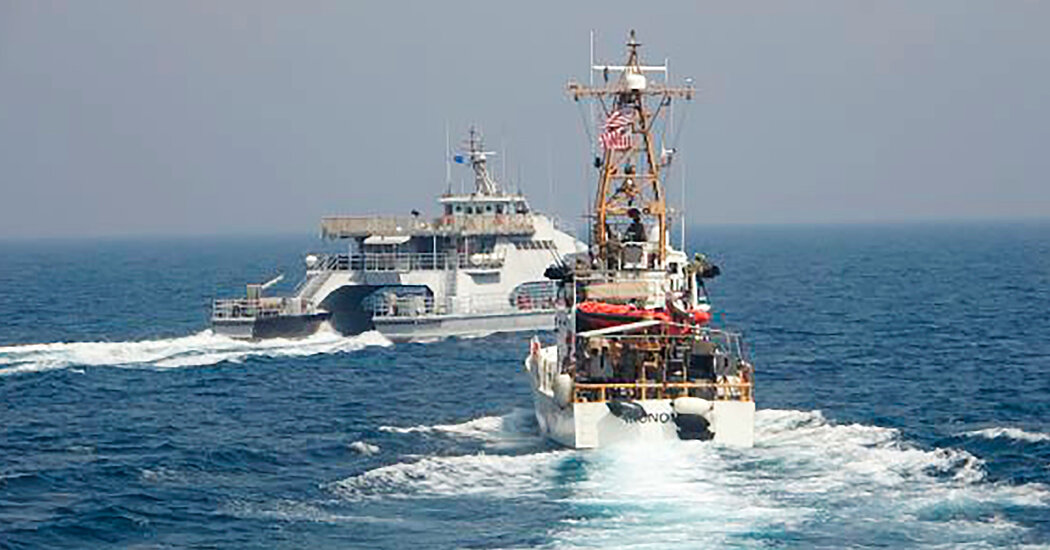WASHINGTON — For the second time in a month, vessels from Iran and the United States came dangerously close in the Persian Gulf on Monday night, the Navy said on Tuesday, escalating tensions between the two nations as their negotiators have resumed talks toward renewing the 2015 nuclear deal.
According to the U.S. Navy’s Fifth Fleet in Bahrain, three fast-attack craft from Iran’s Islamic Revolutionary Guards Corps sailed close to a Navy coastal patrol ship and a Coast Guard patrol boat as the two American vessels were patrolling international waters in the northern part of the Persian Gulf.
At about 8 p.m. local time Monday, the Iranian boats rapidly and repeatedly approached the American ships, the Firebolt and the Baranoff — at one point coming as close as 68 yards, according to a Navy statement.
The American crews issued multiple warnings via bridge-to-bridge radio and loudspeakers, but the Iranian vessels continued their close-range maneuvers, the Navy said. When the Firebolt’s crew fired warning shots, the Iranian vessels moved away “to a safe distance from the U.S. vessels,” the Navy said.
It was the second time in a month that Iran has carried out harassing maneuvers against Navy or Coast Guard ships in the region, after a year of relative maritime peace.
That interaction was the first “unsafe and unprofessional” episode involving Iran since April 15, 2020, said Cmdr. Rebecca Rebarich, a Fifth Fleet spokeswoman. In 2017, the Navy recorded 14 such harassing interactions with Iranian forces, compared with 35 in 2016 and 23 in 2015.
In 2016, Iranian forces captured and held overnight 10 U.S. sailors who strayed into the Islamic Republic’s territorial waters.
However, such incidents had mostly stopped in 2018 and for nearly the entirety of 2019, Commander Rebarich said. The episodes at sea have almost always involved the Revolutionary Guards, which reports only to the supreme leader, Ayatollah Ali Khamenei.
The earlier encounter this month happened on April 2, when a Revolutionary Guards Corps ship, the Harth 55, accompanied by three fast-attack vessels, harassed two Coast Guard cutters, the Wrangell and the Monomoy, as they were conducting routine security patrols in the international waters of the southern Persian Gulf, the Navy said in a separate statement issued earlier on Tuesday. That episode was earlier reported by The Wall Street Journal.
The Harth 55 repeatedly cut in front of both U.S. vessels at extremely close range, coming as close as 70 yards, the Navy said. The American crews issued multiple warnings via bridge-to-bridge radio, five short blasts from the ships’ horns, but the Iranian ships continued, the Navy said.
After about three hours of the American ships issuing warnings and conducting defensive maneuvers to avoid collisions, the Iranian vessels moved away.
American military analysts noted that the Iranian warships targeted some of the smallest and most lightly armed Navy and Coast Guard ships in the region, indicating the Iranians perhaps wanted to make a statement without a high risk of getting their people killed.
Navy cruisers and destroyers, which are far larger than the ships that were harassed and carry a much deadlier complement of weapons, have special 5-inch shells — developed after the deadly attack in 2000 on the destroyer Cole in Yemen — that are specifically devised to take out small fast-attack craft like these from the Iranians. But the American vessels targeted this month have no such weaponry aboard.
The incident on Monday night occurred just days after a leaked audiotape offered a glimpse into the behind-the-scenes power struggles of Iranian leaders. In the recording, Foreign Minister Mohammad Javad Zarif said the Revolutionary Guards Corps called the shots, overruling many government decisions and ignoring diplomatic advice.
In one extraordinary moment on the tape, Mr. Zarif departed from the reverential official line on Maj. Gen. Qassim Suleimani, the commander of the Guards’ elite Quds Force, the foreign-facing arm of Iran’s security apparatus, who was killed by the United States in January 2020.
“In the Islamic Republic, the military field rules,” Mr. Zarif said in a three-hour conversation that was a part of an oral history project documenting the work of the current administration.
John Ismay contributed reporting.



